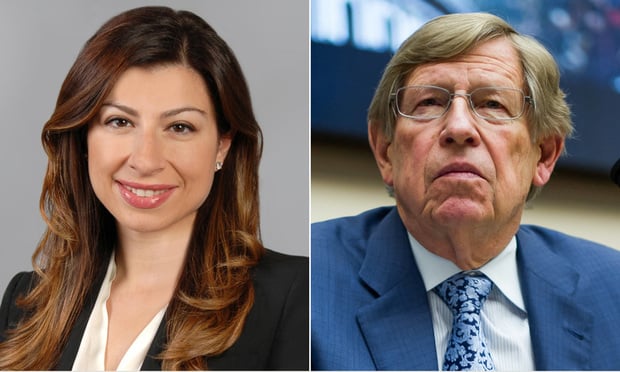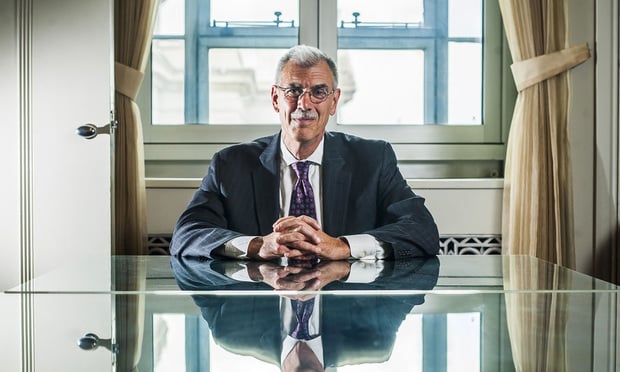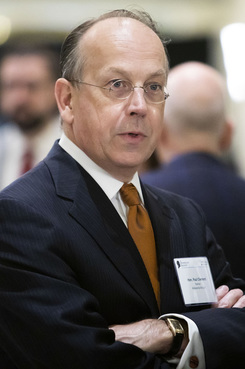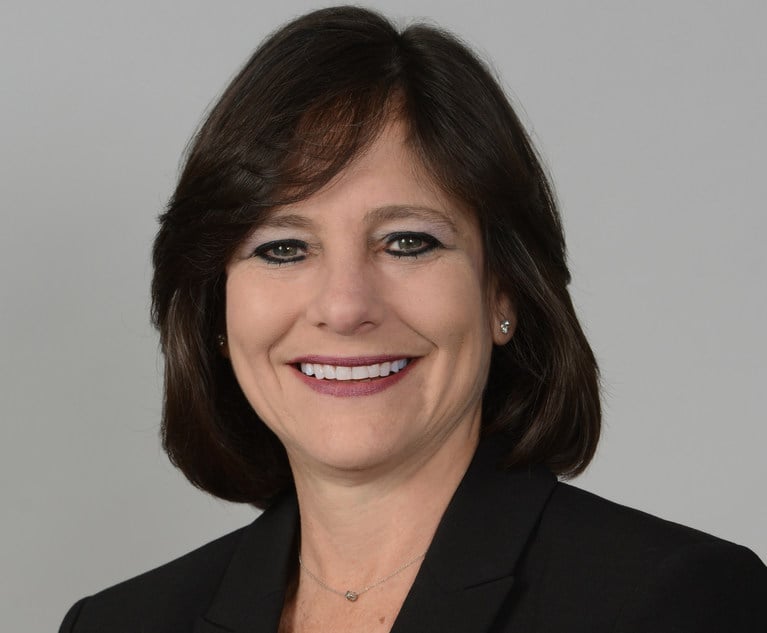What New SCOTUS Cases Reveal About Big Law Billing Rates
The city of Boise has agreed to pay Gibson Dunn a flat fee of $75,000 to prepare a Supreme Court petition, and another $225,000 for briefing and oral argument if the justices take the case.
August 27, 2019 at 10:53 AM
6 minute read
The original version of this story was published on National Law Journal
 Gibson Dunn partners Theane Evangelis and Theodore Olson.
Gibson Dunn partners Theane Evangelis and Theodore Olson.
A team from Gibson, Dunn & Crutcher has agreed to charge the city of Boise, Idaho, up to $300,000 to try to persuade the U.S. Supreme Court to reinstate a city law that would impose certain penalties on homeless and other individuals who sleep on public property, according to an engagement letter that offers new insight into billing practices at the high court.
The Gibson Dunn lawyers include Los Angeles-based partner Theane Evangelis and Theodore Olson, a former U.S. solicitor general and longtime appellate advocate who reportedly bills at least $1,800 an hour. Boise agreed to pay Gibson Dunn a flat fee of $75,000 to prepare the Supreme Court petition, and the firm said it would cost Boise another $225,000 for briefing and oral argument if the justices take the case, according to contract documents reviewed by The National Law Journal.
The Gibson Dunn records and other recent or pending matters involving Supreme Court lawyers provide the latest—and rare—peek inside the billing arrangements and rates of some of the country's biggest firms and their appellate leaders.
Evangelis and Olson did not return messages seeking comment about what Boise is paying for the Supreme Court litigation. The $75,000 cost for the petition, filed on Aug. 22, appears to be a discounted amount. The costs for writing a petition often can range from $150,000 to $200,000, according to one top firm with a Supreme Court practice, and merits stage briefing, including oral argument, can cost $750,000 or more.
Some top firms with Supreme Court practices choose to discount fees for nonprofit entities, including government clients.
Gibson Dunn was part of a so-called beauty contest among other firms competing for Boise's work. "Once it became clear that we were going to be asking the Supreme Court to take a look, we were contacted by a number of firms from around the country," Mike Journee, spokesman for Boise's mayor, told The National Law Journal. "We had conversations. Gibson Dunn was our choice."
Journee earlier told the Idaho Statesman that the engagement with Gibson Dunn was a "great deal."
Meanwhile, Gibson Dunn's Olson could face Donald Verrilli Jr. of Munger, Tolles & Olson in October in a dispute over the status of the Financial Management and Oversight Board of Puerto Rico, which Congress established in 2016 to help Puerto Rico recover from a financial crisis. Olson represents Aurelius Investment, a creditor of the commonwealth of Puerto Rico.
Munger Tolles is billing the oversight board, a public body, and Verrilli, a former Obama-era U.S. solicitor general, is lead counsel.
 Former U.S. Solicitor General Donald Verrilli Jr. in his office at the U.S. Department of Justice in June. Credit: Diego M. Radzinschi/ ALM
Former U.S. Solicitor General Donald Verrilli Jr. in his office at the U.S. Department of Justice in June. Credit: Diego M. Radzinschi/ ALMPublicly filed billing records in the case show Verrilli's hourly rate is $1,300, up from $1,225 in 2017, when the oversight board first engaged Munger Tolles. Daniel Collins, who was recently confirmed to the U.S. Court of Appeals for the Ninth Circuit, was billing at $1,075, and Ginger Anders, a former assistant to the solicitor general and clerk to Justice Ruth Bader Ginsburg, has billed at $900 per hour. Munger Tolles said it is applying a 15% discount to its standard hourly rates.
The oversight board was created to oversee Puerto Rico's restructuring of more than an estimated $100 billion in debt. More broadly, the debt-related litigation has driven hundreds of millions of dollars in fees for major U.S. firms.
A number of Supreme Court advocates declined to share their billing arrangements and hourly rates, discounted or otherwise.
 Paul Clement, with Kirkland & Ellis.
Paul Clement, with Kirkland & Ellis.Kirkland & Ellis partner Paul Clement, a former U.S. solicitor general in the George W. Bush administration, was billing at $1,745 as recently as March, according to records in a case involving Parker Drilling Management. The Supreme Court in June held that California's wage-and-hour law does not apply to the Outer Continental Shelf when federal law addresses the relevant issue.
Fellow Kirkland partner George Hicks Jr., who clerked for Chief Justice John Roberts Jr. and who worked on the Parker Drilling case with Clement, billed at $1,075 an hour, the records show. Appellate veteran and former Kirkland partner Christopher Landau, who was confirmed on Aug. 1 as the next U.S. ambassador to Mexico, was billing at $1,495 an hour, according to the filings. Kirkland partner Bartow Farr, who's argued dozens of cases at the high court, billed at $1,385 hourly.
In a fee request in Texas federal district court last year, Thomas Goldstein, a founder of the Washington appellate boutique Goldstein & Russell, identified his rate as $1,350. Goldstein's colleague Eric Citron reported his billing at $850. He said in a filing that Goldstein & Russell, as a small firm, often uses "alternative fee arrangements, including flat fees or contingent fee arrangements. Even in these cases, we typically recover our full hourly rates on average."
The lure of Supreme Court work and competition for the court's relatively small docket is intense for members of the elite Supreme Court bar. Not every instance where a major U.S. firm represents a local or state government client is paid work.
Last term, Jones Day partner Shay Dvoretzky, who has a very active Supreme Court practice involving large corporate clients, argued on behalf of the city of Riviera Beach, Florida, in a First Amendment case. Jones Day, according to an engagement letter, didn't charge the city.
Read more:
Big Law Billed Republicans Millions to Sue Obama. Against Trump, Firms Are Working for Free.
Chris Landau's Nominee Disclosure Shows $11M From Kirkland, $3M From Quinn
Puerto Rico Cases Pit Don Verrilli Against Ted Olson at Supreme Court
2 Big Law Firms Get $1M-Plus Work Defending DC's Transit Agency in Ad Fight
This content has been archived. It is available through our partners, LexisNexis® and Bloomberg Law.
To view this content, please continue to their sites.
Not a Lexis Subscriber?
Subscribe Now
Not a Bloomberg Law Subscriber?
Subscribe Now
NOT FOR REPRINT
© 2025 ALM Global, LLC, All Rights Reserved. Request academic re-use from www.copyright.com. All other uses, submit a request to [email protected]. For more information visit Asset & Logo Licensing.
You Might Like
View All
Big Company Insiders See Technology-Related Disputes Teed Up for 2025

Litigation Leaders: Jason Leckerman of Ballard Spahr on Growing the Department by a Third Via Merger with Lane Powell

Litigation Leaders: Greenspoon Marder’s Beth-Ann Krimsky on What Makes Her Team ‘Prepared, Compassionate and Wicked Smart’
Trending Stories
- 1Many LA County Law Firms Remain Open, Mobilize to Support Affected Employees Amid Historic Firestorm
- 2Stevens & Lee Names New Delaware Shareholder
- 3U.S. Supreme Court Denies Trump Effort to Halt Sentencing
- 4From CLO to President: Kevin Boon Takes the Helm at Mysten Labs
- 5How Law Schools Fared on California's July 2024 Bar Exam
Who Got The Work
Michael G. Bongiorno, Andrew Scott Dulberg and Elizabeth E. Driscoll from Wilmer Cutler Pickering Hale and Dorr have stepped in to represent Symbotic Inc., an A.I.-enabled technology platform that focuses on increasing supply chain efficiency, and other defendants in a pending shareholder derivative lawsuit. The case, filed Oct. 2 in Massachusetts District Court by the Brown Law Firm on behalf of Stephen Austen, accuses certain officers and directors of misleading investors in regard to Symbotic's potential for margin growth by failing to disclose that the company was not equipped to timely deploy its systems or manage expenses through project delays. The case, assigned to U.S. District Judge Nathaniel M. Gorton, is 1:24-cv-12522, Austen v. Cohen et al.
Who Got The Work
Edmund Polubinski and Marie Killmond of Davis Polk & Wardwell have entered appearances for data platform software development company MongoDB and other defendants in a pending shareholder derivative lawsuit. The action, filed Oct. 7 in New York Southern District Court by the Brown Law Firm, accuses the company's directors and/or officers of falsely expressing confidence in the company’s restructuring of its sales incentive plan and downplaying the severity of decreases in its upfront commitments. The case is 1:24-cv-07594, Roy v. Ittycheria et al.
Who Got The Work
Amy O. Bruchs and Kurt F. Ellison of Michael Best & Friedrich have entered appearances for Epic Systems Corp. in a pending employment discrimination lawsuit. The suit was filed Sept. 7 in Wisconsin Western District Court by Levine Eisberner LLC and Siri & Glimstad on behalf of a project manager who claims that he was wrongfully terminated after applying for a religious exemption to the defendant's COVID-19 vaccine mandate. The case, assigned to U.S. Magistrate Judge Anita Marie Boor, is 3:24-cv-00630, Secker, Nathan v. Epic Systems Corporation.
Who Got The Work
David X. Sullivan, Thomas J. Finn and Gregory A. Hall from McCarter & English have entered appearances for Sunrun Installation Services in a pending civil rights lawsuit. The complaint was filed Sept. 4 in Connecticut District Court by attorney Robert M. Berke on behalf of former employee George Edward Steins, who was arrested and charged with employing an unregistered home improvement salesperson. The complaint alleges that had Sunrun informed the Connecticut Department of Consumer Protection that the plaintiff's employment had ended in 2017 and that he no longer held Sunrun's home improvement contractor license, he would not have been hit with charges, which were dismissed in May 2024. The case, assigned to U.S. District Judge Jeffrey A. Meyer, is 3:24-cv-01423, Steins v. Sunrun, Inc. et al.
Who Got The Work
Greenberg Traurig shareholder Joshua L. Raskin has entered an appearance for boohoo.com UK Ltd. in a pending patent infringement lawsuit. The suit, filed Sept. 3 in Texas Eastern District Court by Rozier Hardt McDonough on behalf of Alto Dynamics, asserts five patents related to an online shopping platform. The case, assigned to U.S. District Judge Rodney Gilstrap, is 2:24-cv-00719, Alto Dynamics, LLC v. boohoo.com UK Limited.
Featured Firms
Law Offices of Gary Martin Hays & Associates, P.C.
(470) 294-1674
Law Offices of Mark E. Salomone
(857) 444-6468
Smith & Hassler
(713) 739-1250







